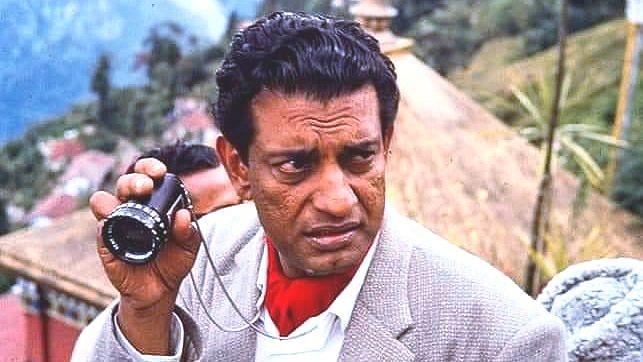'Kanchenjunga' is the first color film of Satyajit Ray's legendary director. But there is no extravagance of color across the canvas of the picture, rather he has painted an enchanting reflection of life in the swaying of clouds and fog. Why did he make such a movie with nature?

"Don't get married without falling in love" Shankara said to Manisha. Who is Manisha? Manisha is the heroine of Satyajit Ray's 'Kanchenjunga'. But I have objection to the word heroine. I don't think Manisha is a heroine. In the movie 'Kanchenjunga', the heroine is time, color, form, cloud, fog, nature. Look at Anima's saree. He is trapped in a false marriage. The stripes on her saree will remind you of a prison cell. On the other hand Manisha's life is still open sky. There was no shadow of a dark cloud. So the color of the sunrise is on your saree. Suddenly talking about Manisha, because today is Satyajit Ray's birthday. 'Kanchenjunga' is a very comfortable and relaxing movie for me. A collage of pieces expressing an unexplained world. How do I feel for common flesh and blood Lavanya Roy Chowdhury in front of Parbatsam Ahamika of ten company owner Roy Bahadur Indranath Roy Chowdhury. These people move around in the patriarchal atmosphere created by capital and money in man-made civilization. Shankar is Manisha's elder sister's husband. He languishes in a loveless marital relationship. But we cannot put anyone in jail. Because, not the individual, the antagonist here is the patriarchal structure. I like to see the journey of people moving beneath this complicated phrase. People walk the streets throughout the movie. They tell a story of an afternoon, not a story, but a few stories.
Satyajit Ray's other films have moved away from the story-telling style, and here he has painted a different picture. In this context I found the canvas of Vibhutibhushan Banerjee. A new face on every page, a new atmosphere of events. For a very short period of time different accessories appeared; But they leave a thousand impressions in the mind. In 'Kanchenjunga', Satyajit has created a canvas of fragmented memories of the seemingly isolated people within a family.
This is Satyajit's first color film, but there is no excess of color, instead he paints a mesmerizing picture of life in the swaying of clouds and mist. The plain orange saree on Manisha's body is like a little dawn. I read at one place, Alkananda, who played the role of Manisha, was upset about the color of her saree and went straight to Satyajit Roy and said, 'Didi is wearing a beautiful saree! And my day is monochromatic, not that bright either. Satyajit Roy said in reply, 'Look at Anima's saree. He is trapped in a false marriage. The stripes on her saree will remind you of a prison cell. On the other hand Manisha's life is still open sky. There was no shadow of a dark cloud. So the color of the sunrise is on your saree.
Thinking about colors brings to mind the face of Monica Ananda from Antonioni's 'Red Desert'. The mix of base's golden hair and dark green adds a new dimension to the base's underworld desert, sheer emptiness. While telling the story of tension between human relations, he spreads colors in layers. Although the color of Kanchanjungha is very pale. Manisha, Anima, Lavanya, Shankar, Anil, Ashoka and Indranath - all these characters have been portrayed by Satyajit in their inner and outer world. As the saying goes, you know by color. How many colors play across the nature of Darjeeling, while the people on the canvas of the picture walk along a pale and pale path. They are as if everyone is a prisoner in everyone's life. To yourself, to others. At the end of the movie, Rabindranath appears in the voice of Lavanya, "Who will be saved in this paradise, who will be saved in doubt, in peace, in grief?" A little Kanchenjunga can be seen from the front. Clouds are floating and enveloping him. A deep ditch ahead. What a bottomless void...standing in front of such a void and thinking about Manisha, I remember Charu's words. 'Charu' of the 'Nashtneed' story has expanded to the golden peak of Kanchenjunga. With Satyajit Ray's love for Kanchan! Written by: Labani Ashrafi
No comments:
Post a Comment